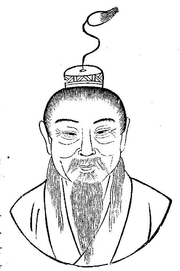Liu Xiang (scholar)
| Liu Xiang | |
|---|---|
 | |
| Born | Liu Gengsheng 77 BCE Xuzhou, Han Dynasty |
| Died | 6 BCE (aged 71) |
| Issue | Liu Xin |
| Father | Liu De, Marquis Miao of Yangcheng |
| Occupation | Historian |
| Liu Xiang | |||||||||||||||||||||||||||||||
|---|---|---|---|---|---|---|---|---|---|---|---|---|---|---|---|---|---|---|---|---|---|---|---|---|---|---|---|---|---|---|---|
| Traditional Chinese | 劉向 | ||||||||||||||||||||||||||||||
| Simplified Chinese | 刘向 | ||||||||||||||||||||||||||||||
| |||||||||||||||||||||||||||||||
Liu Xiang (Chinese: 劉向) (77–6 BCE[1]), born Liu Gengsheng (劉更生), courtesy name Zizheng (Chinese: 子政), was a government official, scholar, and author who lived during the Han Dynasty of China. Among his polymathic scholarly specialties were history, literary bibliography, and astronomy. He is particularly well known for his bibliographic work in cataloging and editing the extensive imperial library.
Life
Family
Liu Xiang was born in Xuzhou. Being a distant relative of Liu Bang, the founder of the Han dynasty, he was thus a member of the ruling dynastic clan (the Liu family). Liu Xiang's father ranked as a marquess.[2] Liu Xiang's son, Liu Xin, would continue the scholarly tradition of his father and his relative Liu An (the Prince of Huainan).
Middle career
By the beginning of Han Yuandi's reign, Liu Xiang was a member of a group of Confucian officials, including Xiao Wangzhi, who wished to limit the power of the emperor's female family member's relatives' clans, the Shi and the Xu; but, ended up on the wrong side of a power struggle involving the powerful eunuchs Hong Gong and Shi Xian. Again, briefly imprisoned, Liu Xiang was soon released, but terminated from official position, and he received no new appointments to office for the next fifteen years.[3]
Bibliographer
The succession of Han Chengdi to the imperial throne was accompanied by a realignment of power, among the various factions involved in government, and Liu Xiang was finally on the right side of things for the purpose of an official career in the Han government. In 26 BCE, at the command of emperor Han Chengdi, Liu Xiang spent much of the rest of the some 20 years of his life engaged in his massive bibliographic work on organizing the imperial library. This work was assisted by his son, Liu Xin, who finally completed the task, after his father's death.
Works
Liu compiled the first catalogue of the imperial library, the Bielu, or Abstracts (別錄/别录), and was the first known editor of the Shan Hai Jing (finished by his son).[4] Liu was a prodigious collector (or writer) of stories and other works, which he compiled into the Zhan Guo Ce, the Xinxu (新序, "New Prefaces"), the Shuoyuan (說苑, "Garden of Stories"), the Lienü Zhuan ("Biographies of Exemplary Women", and probably the Liexian Zhuan (a Daoist hagiography).
Liu Xiang was a poet in his own right, and is attributed as the author of the Chuci anthology's "Nine Laments" ("Jiu tan").[5]
See also
- Confucian classics
- Guodian Chu Slips
- Liu An
- Science and technology of the Han Dynasty
- Sima Tan
- Sima Qian
Notes
References
- Fei, Zhengang, "Liu Xiang". Encyclopedia of China (Philosophy Edition), 1st ed.
- Hawkes, David, translator and introduction (2011 [1985]). Qu Yuan et al., The Songs of the South: An Ancient Chinese Anthology of Poems by Qu Yuan and Other Poets. London: Penguin Books. ISBN 978-0-14-044375-2
- Loewe, Michael. (1986). "The Former Han Dynasty," in The Cambridge History of China: Volume I: the Ch'in and Han Empires, 221 B.C. – A.D. 220, 103–222. Edited by Denis Twitchett and Michael Loewe. Cambridge: Cambridge University Press. ISBN 0-521-24327-0.
